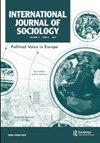Transnational social movement organizations and gender mainstreaming bureaucracies: an event history analysis, 1981-1998
IF 1.8
Q2 SOCIOLOGY
引用次数: 1
Abstract
Abstract The 1980s and 1990s marked an explosive historical period in both the advancement of transnational social movement organizations and changes in the institutional structures of nation states. As a new set of global norms and values emerged, independent campaigns (women’s rights, human rights, and development) began to overlap and intersect. However, scholars, activists, and policy makers often view transnational social movement organizations as issue-specific and isolated from one another. Consequently, few empirical studies explore whether either transnational organizations in general or specific types of transnational organizations affect world cultural policy. Additionally, only a small body of literature questions variation in these relationships among developed and developing nations. One place where organizations worked both independently and jointly was in the global movement to establish national bureaucracies for gender mainstreaming. Yet, despite its global popularity, mainstreaming played out as a different process in developed and developing nations. This paper examines the relationship between national gender policy, rights-based organizing, and economic development. It asks how these forces each impacted the likelihood of the establishment of national bureaucracies for gender mainstreaming during the 1980s and 1990s. Results illustrate the power of transnational social movement organizations broadly in the advancement of gender policy among nations of both the developed and developing world as well as the unique role of democracy, intergovernmental organizations, and foreign aid in understanding the variation in the experiences of developed verses developing nations.跨国社会运动组织与性别主流化官僚机构:1981-1998年事件历史分析
20世纪80年代和90年代是跨国社会运动组织发展和民族国家制度结构变化的爆炸性历史时期。随着一套新的全球规范和价值观的出现,独立运动(妇女权利、人权和发展)开始重叠和交叉。然而,学者、活动家和政策制定者经常将跨国社会运动组织视为特定问题和彼此孤立的组织。因此,很少有实证研究探讨一般跨国组织或特定类型的跨国组织是否影响世界文化政策。此外,只有一小部分文献质疑发达国家和发展中国家之间这些关系的差异。各组织既独立又联合开展工作的一个地方是在全球运动中建立促进性别主流化的国家官僚机构。然而,尽管主流化在全球很受欢迎,但在发达国家和发展中国家,主流化的过程是不同的。本文考察了国家性别政策、权利组织与经济发展之间的关系。报告询问了在1980年代和1990年代,这些力量分别如何影响建立国家官僚机构以实现性别主流化的可能性。研究结果表明,跨国社会运动组织在发达国家和发展中国家推进性别政策方面具有广泛的力量,同时也说明了民主、政府间组织和外援在理解发达国家和发展中国家经验差异方面的独特作用。
本文章由计算机程序翻译,如有差异,请以英文原文为准。
求助全文
约1分钟内获得全文
求助全文

 求助内容:
求助内容: 应助结果提醒方式:
应助结果提醒方式:


